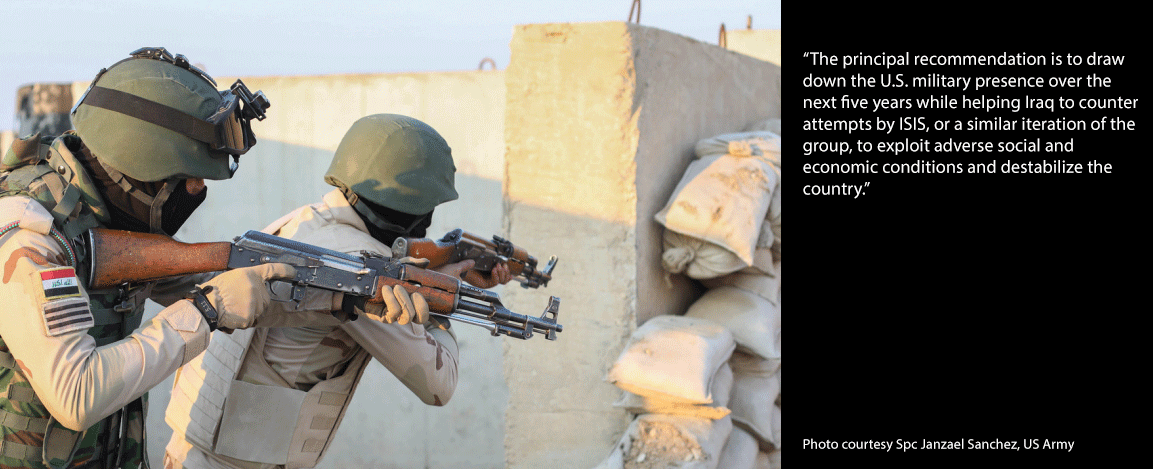CIS Wilhelm Fellow Steven Simon and Adam Weinsten present a proposal for a phased military withdrawal from Iraq, published by the Quincy Institute for Responsible Statecraft. This paper is available online here. An excerpt is featured below.
March 2023 marks two decades since the US invasion of Iraq. Saddam Hussein is long gone, memories of the post–invasion civil war are fading (from the American mind, at least), even as the large troop cohort that invaded Iraq, and later surged to stanch a spiraling insurgency that it helped create, have been redeployed. Parliamentary elections are routine, and the ISIS threat has been significantly degraded. The political and perceptual domestic and foreign costs of both intervention and withdrawal have, for the most part, already been incurred. The level of violence is much reduced and oil is flowing. The problems facing a new generation of Iraqis are largely economic, as massive protests in 2019 made clear, and a year–long effort to seat a government after the 2021 parliamentary election made it equally clear that the structure of Iraqi politics was both durable yet dysfunctional. The memory of the sectarian civil war that followed the U.S. invasion and the ISIS conquest of much of the country still looms large for Iraqis.
US interests in Iraq are derived from an interest in regional stability and impel the continuation of an “advise, assist, and enable” mission in the near term. There is no need, however, to maintain a long–term military presence in the country. The United States must manage a delicate balancing act: While Iraq’s security forces have improved considerably, a sudden withdrawal of a substantial number of US troops could halt or reverse these gains. On the other hand, the continued presence of US troops in the medium term could erode Iraqi motivation to field a competent professional force and maintain readiness. With US troops as a fail–safe against the rise of ISIS, Iraqi leaders might not be motivated to invest in their country’s defense. The perception that Washington is available to keep a lid on ISIS also frees up the IRGC (Islamic Revolutionary Guard Corps), Iran–aligned militias, and the Gulf states to carry out their own agendas, which frequently run counter to U.S. interests.1
Disengaging militarily from Iraq will likely reduce US influence in Baghdad and Erbil. Washington’s weight should not be exaggerated, but it is real and the presence of US troops reinforces it. The new Iraqi government, led by Mohammed Shia al–Sudani, has publicly endorsed the US military presence with the consent of his coalition partners. Nevertheless, bilateral diplomatic relations do not typically rely on U.S. deployed forces; normalization of the US–Iraq relationship will ultimately entail the drawdown of US forces. And as in all things, there will be diminishing returns to scale of the US advise–and–assist program over time. The opportunity and transition costs of withdrawal will diminish proportionately.
We suggest the following steps to guide US engagement with Iraq. It is based on our analysis of open–source data, academic literature, government and think–tank reports, and extensive interviews, conducted on and off the record, between May 2022 and February 2023 with current and former US officials in the State Department, Pentagon, and White House, senior Iraqi security officials and politicians, community activists, and journalists. The principal recommendation is to draw down the US military presence over the next five years while helping Iraq to counter attempts by ISIS, or a similar iteration of the group, to exploit adverse social and economic conditions and destabilize the country. The most the US can reasonably expect to achieve is an improvement in the technical capabilities and professionalism of a select few elite units, while providing counsel to Iraq’s leaders, primarily through regular contact between the US ambassador in Baghdad, Prime Minister al–Sudani, and other Iraqi stakeholders.
Read the full paper here.




